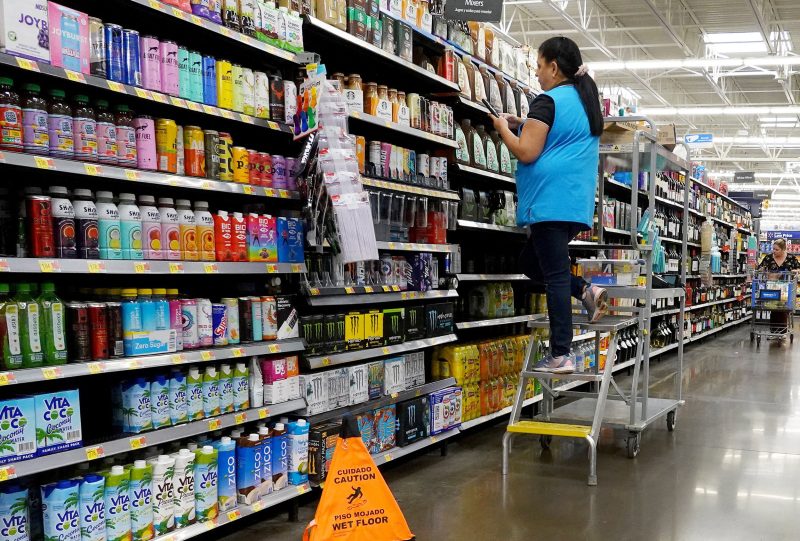Walmart Inc. is warning major packaged goods makers that it can no longer stomach their price hikes, pitching its own private-label products to shoppers as less-expensive alternatives to suppliers’ name-brand goods.
For the world’s biggest retailer, which reports earnings Feb. 21, any increase in prices — even by just a few cents — can have negative effects, prompting some shoppers to look for bargains at dollar stores or warehouse chains such Costco.
Walmart, which touts its “Everyday Low Price” policy, raised prices last year on milk, frozen meals and Tide detergent, to name a few, as its suppliers battled soaring costs of everything from chemicals to wheat and fuel.
But now with the cost of cardboard cases declining by 40-50%, the cost of transportation falling by 25-30% and the cost of raw materials declining significantly, “retailers like Walmart will say ‘hey you already had three rounds of price hikes last year, why are you giving us another?’” said Burt Flickinger, managing director at retail consulting firm Strategic Resource Group.
Rod Little, CEO of Schick razor maker Edgewell Personal Care Co., told Reuters that it “will be very difficult” to pass new price increases through to retailers going forward. Walmart is Edgewell’s biggest customer.
“(Walmart) said to us, ‘From here, our consumer is challenged, we’re going to be looking out for consumers, so you’re going to have to have really good reasons if you’re going to price up from here,” Little said in an interview.
“Because the consumer is now under more pressure, and Walmart is under pressure, that sets up a dynamic where there’s probably not a lot of pricing going forward.”
Walmart did not respond to a request for comment.
At Unilever, the purveyor of Dove soap, Knorr bullion cubes and Hellmann’s mayonnaise, finance chief Graeme Pitkethly said Thursday that it was “not yet past peak pricing,” even after implementing a record 13.3% average price hike in the fourth quarter of 2022. Unilever estimated net material inflation of $1.5 billion euros ($1.6 billion) in the first half of this year.
Procter & Gamble, maker of Tide detergent and Pampers diapers, said on January 19 it would continue to raise prices despite seeing a drop in volumes. It sells more than $10 billion worth of products through Walmart.
To be sure, Walmart has the upper hand. Its own store brands, Great Value and Equate, compete directly with Unilever’s and P&G’s product lines in the United States. Forty-three percent of all purchases of store brand packaged goods made online in the U.S. were on Walmart.com, according to the research firm Numerator, which measured transactions for the last quarter of 2022.
The clout Walmart holds over suppliers also means that Walmart would likely get the lowest percentage of any price hikes manufacturers implement, according to investors who track the company. “Walmart is just a conduit (for P&G and Unilever) that uses its enormous size to provide the best deals it can for customers,” said David Klink, senior equity analyst at Huntington Private Bank.
“We would think Walmart might emerge with less of a consumer goodwill hit than these other companies in a rising-price environment,” said Kilnk, whose firm holds more than $45 million in Walmart shares.
Walmart previously has pulled products from shelves over disputes on pricing. In 2018, Walmart pulled Campbell Soup Co.’s products during the key winter season over a dispute over prices and shelf space promotion.
Across the pond, tussles between Britain’s largest supermarket chain Tesco and Kraft Heinz led to Heinz baked beans being removed from shelves. At the time, Tesco labeled Heinz’s price hikes as “unjustifiable.”
Huggies diaper maker Kimberly-Clark said it was embedding additional pricing this year, while toothpaste maker Colgate said it planned further price hikes in the first half of 2023.
“We’re trying to figure out with our (dry grocery and consumables) suppliers, what could we do that’s different that would help mitigate some of those costs?” Walmart CEO Doug McMillon said at an investor conference in December.
“Unfortunately, some of those suppliers are still pointing us towards more inflation next year on top of the mid-double digits this year. And we don’t like that for any reason,” he said.
Shoppers at chains such as Walmart and Kroger were waiting longer to buy new products like bleach and kitty litter, and in some cases trading down to buy smaller sizes, or larger wholesale quantities because they want more value per unit, Clorox’s CFO Kevin Jacobsen said February 2.
After raising prices four times in 2022, he said, Clorox doesn’t “have any additional plans” to hike prices this year.

